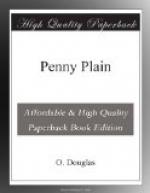“Reids who lived in The Rigs thirty years ago? But I knew them. I know all about them. It was I who suggested to Alison Jardine that the cottage would suit her. She had lost a lot of money and wanted a small place.... Why, bless me, Augusta, Mrs. Reid, this man’s mother, came from Corlaw; her people were tenants of my father’s. What was the name? I used to be taken to their house by my nurse and get an oatcake with sugar sprinkled on it—a great luxury, I thought. Yes, of course, Laidlaw. She was Jeannie Laidlaw. When I married and came to Hopetoun I often went to see Mrs. Reid. She reminded me of Corlaw, and could talk of my father, and I liked that.... Her husband was James Reid. He must have had some money, and I think he was retired. He had a beard and came from Fife. I remember the east-country tone in his voice. They went to the Free Kirk, and I overheard, one day, a man say to him as we came out of church (where a retiring collection for the next Sunday had been announced), ‘There’s an awfu’ heap o’ collections in oor kirk,’ and James Reid replied, ‘Ou ay, but ma way is to pay no attention.’ When I told your father he was delighted and said that he must take that for his motto through life—’Ma way is to pay no attention.’”
Mrs. Hope took off her glasses and smiled to herself over her recollections.... “Mrs. Reid was a nice creature, ‘fair bigoted,’ as they say here, on her son Peter. He was her chief topic of conversation. Peter’s cleverness, Peter’s kindness to his mother, Peter’s good looks, Peter’s fine voice: when I saw him—well, I thought we should all thank God for our mothers, for no one else will ever see us with such kind eyes.... And it’s this Peter Reid—Jeannie Laidlaw’s son—who has enriched Jean. Well, Augusta, I must say I consider it rather a liberty.”
Augusta looked at her mother with an amused smile.
“Yes, Augusta, it was a pushing, interfering sort of thing to do. What is the child to do with a great fortune? I’m not afraid of her being spoiled. Money won’t vulgarise Jean as it does so many people, but it may turn her into a very burdened, anxious pilgrim. She is happier poor. The pinch of too little money is a small thing compared to the burden of too much. The doing without is good for both body and soul, but the great possessions are apt to harden our hearts and make our souls small and meagre. Who would have thought that little Jean would have had the hard hap to become heir to them. But she has a high heart. She may make a success of being a rich woman! She has certainly made a success of being a poor one.”
“I think,” said Augusta, in her gentle voice, “that Peter Reid was a wise man to leave his money to Jean. Only the people who have been poor know how to give, and Jean has imagination and an understanding heart. Haven’t you noticed what a wonderful way she has with the poor people? She is always welcome in the cottages.... And think what a delight she will have in spending money on the boys! But I hope Pamela Reston will do as she had planned and carry Jean off for a real holiday. I should like to see her for a little while spend money like water, buy all manner of useless lovely things, and dine and dance and go to plays.”




